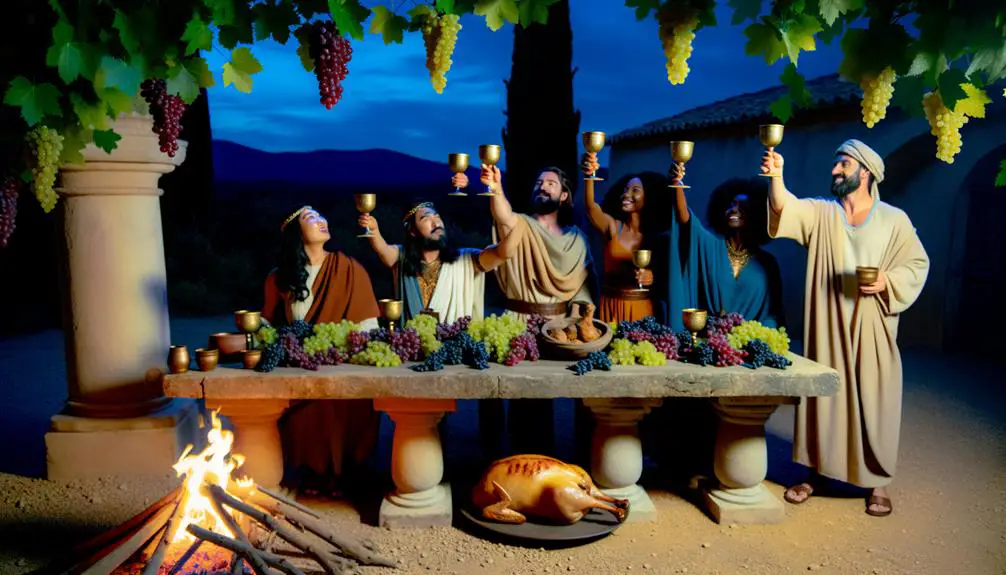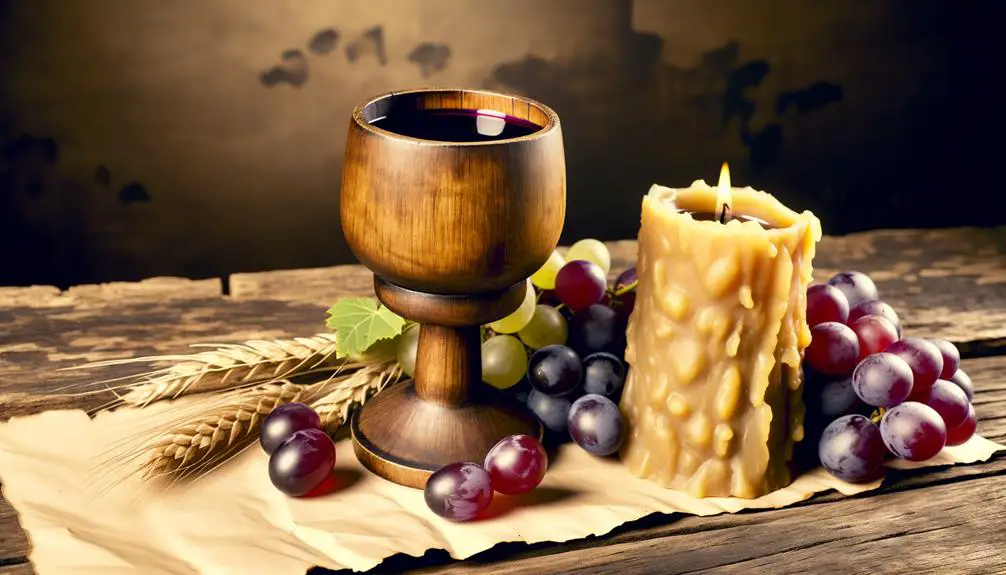Plunge into the biblical layers of wine, from divine blessing to cautionary tales, and uncover its rich symbolism in sacred rituals.

What Does Wine Mean in the Bible
Imagine walking through a vineyard, the rich aroma of ripe grapes filling the air, a symbol of abundance and celebration.
In the Bible, wine holds a complex tapestry of meanings, from a sign of divine blessing to a metaphor for wrath. You'll find it at the heart of sacred rituals and communal feasts, a thread that weaves through stories of covenant, abundance, and caution against excess.
But what deeper insights lie in these ancient texts? Exploring the biblical significance of wine reveals layers of cultural, theological, and moral understanding that might just change the way you view your next glass of wine.
Key Takeaways
- Wine symbolizes joy, celebration, and divine favor, reflecting God's generosity and blessings.
- It is used ritually to represent purity, communion, and sacred covenantal relationships between God and His people.
- Wine serves as a metaphor for both divine wrath and mercy, illustrating the complexities of God's judgment.
- The consumption of wine in the Bible emphasizes moderation, highlighting the dangers of excess and the value of discernment.
Symbol of Celebration

In the biblical narrative, wine frequently emerges as a potent symbol of joy and celebration, marking significant moments of communal festivity and divine blessing. This is no mere coincidence, as wine's role in ancient societies, particularly those of the Near East, was deeply intertwined with social, religious, and economic life.
You'll find that grape cultivation, necessary for wine production, was a laborious process, requiring extensive knowledge, skill, and patience. The successful cultivation of grapes and production of wine, therefore, was a sign of prosperity and divine favor, elevating the social status of those who mastered it.
Analyzing the biblical texts, it becomes evident that wine isn't just a drink; it's a complex symbol embodying joy, prosperity, and the blessing of God. When you look at feasts and celebrations described in the Bible, wine is almost always present, underscoring its importance in fostering community and shared happiness. This inclusion of wine elevates the occasions, marking them as moments of significance and divine approval.
Furthermore, the emphasis on grape cultivation highlights the connection between the land, divine blessing, and human labor. It's a reminder that the fruits of one's labor, when blessed by God, can lead to prosperity and elevated social status. This connection between divine favor, agricultural success, and social elevation is a recurring theme, illustrating the integral role of wine in biblical symbolism.
Therefore, as you delve deeper into the biblical significance of wine, it's crucial to understand its role as a symbol of celebration, prosperity, and divine blessing, deeply rooted in the practices and beliefs of ancient societies.
Emblem of Covenant

Beyond its role as a celebratory drink, wine also serves as a profound emblem of covenant throughout the biblical narrative, symbolizing sacred agreements between the divine and humanity. This symbolism is deeply rooted in the agrarian culture of ancient times, where grape cultivation and the production of wine weren't only vital economic activities but also deeply spiritual endeavors. The meticulous care required in grape cultivation, from the pruning of vines to the harvesting of grapes, mirrors the careful attention and commitment that covenants demand, both divine and human.
Harvest festivals, prominently featuring wine, celebrated the fruition of these labors and God's provision. These occasions weren't merely agricultural milestones; they were moments of renewing and remembering the covenants. The wine, a product of the earth and human labor, symbolized the mutual cooperation and dependency between God and humanity. It represented the blessings of fertility and abundance, promised and fulfilled by God to those in covenant with Him.
Thus, wine's role in the Bible transcends its physicality, embodying the spiritual and covenantal relationship between God and His people. Its presence in rituals and ceremonies is a tangible reminder of the sacred bonds that it represents. The cultivation of grapes and the celebration of harvest festivals aren't just agricultural activities but are imbued with deep covenantal significance. They're acts of faith, affirmations of the enduring relationship between the Creator and His creation, encapsulated in the shared cup of wine.
Wine in Sacred Rituals

Throughout the biblical narrative, wine plays a pivotal role in sacred rituals, serving both as a symbolic gesture of purification and a medium through which the divine communicates with humanity. This multifaceted symbol not only enriches the spiritual significance of these ceremonies but also underscores the importance of ritual purity and offering significance in the biblical tradition.
To understand the depth of wine's role in these sacred practices, consider the following aspects:
- Offering Significance: In offerings and sacrifices, wine is frequently presented alongside burnt offerings and grain sacrifices, symbolizing the outpouring of gratitude and devotion towards the divine. This act of offering wine underscores its value and sacredness as a gift worthy of God.
- Ritual Purity: Wine, in its purity and richness, symbolizes the purification of the individual participating in the ritual. Its use in ceremonies such as the Passover feast highlights the importance of cleansing and preparation before engaging with the divine.
- Communion with the Divine: The sharing of wine in religious observances facilitates a communal connection not only among participants but also between humanity and the divine. This act embodies the covenant relationship that's central to the biblical narrative.
- Symbolic Representation: Beyond its physical consumption, wine symbolizes joy, abundance, and the blessing of God. Its presence in rituals therefore invokes these themes, enriching the spiritual experience of the participants.
In essence, wine's incorporation into sacred rituals within the Bible serves as a complex symbol of offering, purity, communion, and divine blessing, deeply embedding itself into the fabric of biblical spirituality.
Metaphor for Divine Wrath

In the biblical narrative, wine serves not only as a symbol of joy and festivity but also as a potent metaphor for divine wrath.
You'll find that scripture often employs wine to depict the severity of God's judgment and the consequences of human actions.
Wrath Symbols in Scripture
Wine, as a symbol of divine wrath, permeates biblical scripture, offering a nuanced lens through which to understand God's judgment and anger. This metaphor is deeply embedded within the fabric of biblical narratives, serving as a potent symbol for conveying the severity of divine displeasure.
To grasp this concept, consider the following elements:
- Anger Imagery: Wine's transformation from nourishment to a symbol of intoxication parallels God's transition from benevolence to wrath.
- Judgment Metaphor: As wine can lead to a loss of control, it mirrors the overwhelming nature of divine judgment.
- Cup of Wrath: Often, scripture depicts God's punishment as a cup of wine, signifying an unavoidable draught of judgment.
- Harvest Symbolism: The pressing of grapes becomes an allegory for God's process of judgment, where the wicked are separated from the righteous.
This analytical approach reveals how wine, beyond its physical properties, becomes a layered metaphor for understanding the complexities of divine wrath in scripture.
Divine Judgment Examples
Building on the metaphor of wine as divine wrath, let's examine specific instances in scripture where this symbolism illuminates the nature of God's judgment.
Noah's drunkenness post-flood, often interpreted as a lapse into vulnerability, also serves as a stark reminder of humanity's susceptibility to sin, even after divine intervention. This narrative underscores the complexity of divine judgment, juxtaposing salvation with the potential for moral failure.
Similarly, Lot's escape from Sodom, while not directly involving wine, parallels the theme of deliverance amidst divine wrath. The destruction of Sodom acts as a potent symbol of judgment, with Lot's preservation highlighting mercy within condemnation.
These examples, rich in symbolic depth, reveal the multifaceted nature of divine judgment, blending themes of wrath, mercy, and human frailty.
Representation of Abundance

Throughout biblical scripture, wine symbolizes abundance, reflecting societal wealth and divine generosity. This rich symbolism serves as a multifaceted representation of both economic prosperity and social status. By delving deeper into this context, you'll uncover the layers of meaning wine adds to the biblical narrative.
- Economic Prosperity: Wine's presence in scripture often signifies a time of economic well-being. In lands where agriculture was central, the abundance of wine indicated a successful harvest and, by extension, a thriving economy. This prosperity wasn't just about wealth but also about the stability and health of the community.
- Social Status: Sharing wine was an act of hospitality and a sign of one's standing within the community. Those who could afford to provide wine at gatherings were viewed with respect and admiration. Thus, wine became a symbol of not just physical but also social abundance.
- Divine Generosity: Frequent references to wine in the context of blessings from God highlight its role as a symbol of divine generosity. It's depicted as a gift from God, a tangible sign of His favor and a foretaste of the abundance of the Promised Land.
- Festive Celebrations: In biblical times, wine was integral to celebrations and religious feasts, further embedding its association with joy, community, and divine approval. These gatherings underscored the communal aspect of abundance, where prosperity was shared and enjoyed together.
Warning Against Excess

While the biblical narrative often celebrates wine as a symbol of abundance and divine generosity, it also cautions against its excessive consumption, emphasizing the fine line between blessing and potential downfall. This dichotomy reflects a profound understanding of the human condition, recognizing wine's capacity to enrich life while also acknowledging the risks tied to its abuse. The scriptures don't shy away from discussing the health implications of overindulgence, portraying a realistic view of how excessive drinking can lead to physical debilitation, clouded judgment, and moral lapses.
Moreover, the Bible's narrative extends beyond individual consequences to address the societal effects of excessive wine consumption. It illustrates how communities can suffer when indulgence supersedes moderation, leading to social disorder, strained relationships, and diminished productivity. These accounts serve as cautionary tales, urging you to exercise self-control and wisdom in your consumption habits.
The biblical warnings against excess aren't meant to demonize wine but to foster a balanced perspective on its place in human life. They encourage you to appreciate wine's gifts within the boundaries of moderation, mindful of the broader implications of your choices. Through its nuanced portrayal of wine, the Bible offers timeless guidance on navigating the pleasures and pitfalls of this ancient beverage, urging a path that respects both personal health and communal well-being. It's a reminder that the blessings of wine, like many of life's pleasures, are best enjoyed with discernment and restraint.
Connection to Communion

In the realm of Christian ritual, wine's symbolic significance is nowhere more profound than in its role during Communion, where it represents the blood of Christ, signifying sacrifice and covenant. This sacramental act, rooted in the Last Supper, embodies a theological depth that intertwines with the fabric of Christian identity. The use of wine in this rite underscores its integral position within the broader tapestry of Eucharistic interpretations and sacramental origins.
To appreciate this connection, consider the following points:
- Eucharistic Interpretations: Various denominations interpret the presence of Christ in the Eucharist differently. However, the symbolic use of wine as Christ's blood remains a central unifier, emphasizing redemption and unity with God.
- Sacramental Origins: The institution of Communion traces back to the Last Supper, where Jesus used bread and wine as symbols of his impending sacrifice. This moment laid the foundational understanding of wine's sacramental significance.
- Covenantal Symbolism: Wine, representing blood, signifies the New Covenant between God and humanity, sealed by Jesus' sacrifice. This symbolism draws deeply from biblical narratives where covenants are often ratified with sacrifice.
- Theological Depth: Beyond its role in ritual, wine's use in Communion invites participants into a profound reflection on Christ's sacrifice, encouraging a deeper engagement with the mysteries of faith.
Understanding wine's role in Communion offers a window into the rich tapestry of Christian sacramental practice, reflecting both historical continuity and theological depth.
Reflections on Moral Decisions

Exploring the symbolic use of wine in Communion naturally leads us to consider how these rituals inform our moral decisions, especially in the context of living out one's faith. This symbolic act, deeply rooted in biblical teachings, serves not only as a reminder of spiritual commitments but also as a guide through the complex landscape of ethical dilemmas. You're invited to reflect on how this ritual, signifying sacrifice and redemption, can shape your principles and actions in a morally ambiguous world.
Delving deeper, you'll find that the Bible's references to wine, beyond its ceremonial use, often intersect with lessons on moderation, stewardship, and community. These themes offer a rich tapestry of moral guidance, encouraging you to weigh your choices carefully and consider their impact on yourself and others. It's here, in the interplay between sacred text and daily life, that you're challenged to discern the right path amid conflicting pressures and temptations.
Moreover, the act of sharing wine in Communion underscores the value of fellowship and mutual support in navigating ethical dilemmas. It reminds you that you're not alone in your quest for righteousness, bolstering your resolve to act with integrity even when the way forward is unclear. This communal aspect reinforces the idea that moral decision-making isn't just a personal endeavor but a collective journey, guided by shared values and a commitment to the common good.
In essence, reflecting on the role of wine in biblical narratives and rituals enriches your understanding of morality, providing a nuanced framework for confronting ethical dilemmas with wisdom and courage.
Frequently Asked Questions
How Has the Interpretation of Wine's Symbolic Meaning in the Bible Changed Over Different Historical Periods and Cultures?
Throughout history, you've seen wine's symbolic meaning evolve due to cultural shifts and theological debates. Initially, it symbolized prosperity and divine blessing.
However, as cultures collided and theological perspectives widened, interpretations diverged. Some periods emphasized its role in religious rituals, while others viewed it through a moral lens, debating its consumption's righteousness.
This evolution reflects broader changes in society's values and religious understandings, showcasing how symbols adapt over time.
Are There Specific Types or Qualities of Wine That Are Mentioned or Implied in Biblical Texts, and How Do They Relate to the Wines We Know Today?
You're diving into a vineyard of history, where grape harvesting and the fermentation process in biblical times intertwine with today's winemaking practices. The Bible mentions specific types of wine, hinting at qualities through stories and parables. These references, steeped in ancient cultivation and preparation methods, offer a fascinating comparison to modern wines.
Analyzing these texts, you'll uncover how ancient viticulture mirrors, yet diverges from, contemporary oenology.
In What Ways Have Modern Religious Denominations Diverged in Their Understanding and Use of Wine From Biblical Descriptions and Practices?
You'll find modern religious groups have branched out in their treatment of wine, diverging from ancient practices seen in scripture. This shift includes grape cultivation methods, influenced by technological advances, and alcohol regulations, which vary widely across cultures and legal systems.
These changes reflect broader societal shifts and advancements in understanding alcohol's effects, leading to a reevaluation of wine's role in religious ceremonies and consumption practices.
How Do Non-Christian Religions and Belief Systems Interpret the Symbolic Use of Wine in Their Own Contexts, Compared to Its Biblical Meanings?
You're venturing into a vineyard of diverse interpretations when you explore how non-Christian beliefs symbolize wine. Unlike the biblical essence, Hindu Soma rituals celebrate life and connection to the divine through a sacred drink, embodying vitality and immortality.
Meanwhile, Buddhist abstention practices view wine as a distraction from enlightenment, advocating for a path of sobriety. These contrasting beliefs highlight the rich tapestry of spiritual symbolism wine weaves across cultures.
What Role Does Archaeological Evidence Play in Understanding the Production, Consumption, and Significance of Wine in Biblical Times?
Archaeological evidence is crucial in understanding wine's production, consumption, and significance historically. It sheds light on how climate influence and trade routes impacted viticulture, revealing insights into ancient societies' economic, social, and cultural dynamics.
Conclusion
So, what does wine symbolize in the biblical context?
It's a multifaceted symbol, intertwining joy, covenant, divine judgment, and abundance. It serves as a reminder of sacred rituals and the importance of moderation.
Wine's connection to communion underscores its significance in spiritual communion and moral reflection. By analyzing its varied representations, you're invited to appreciate wine's deep theological resonance, urging a thoughtful consideration of its symbolic richness within the biblical narrative.



Sign up